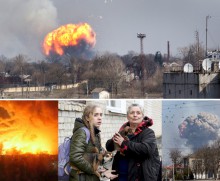At 3 a.m. on March 23, a major incident happened in the city of Balakliia, Kharkiv Region, as explosions started in the depots where munitions were stored. A fire began which engulfed the military facility. According to early reports, no-one was killed or injured. Local authorities stood ready to evacuate 15,000 residents. The General Staff immediately reported that two evacuation camps had already been deployed.
“Huge explosions were heard in the city. An area of 50 kilometer radius was declared off-limits. People are fleeing as best as they can. According to preliminary data, the facility was set on fire in several places. The military prosecutor is already investigating it as a case of sabotage,” military journalist Myroslav Hai posted on Facebook. Local residents report that the facility suffered from localized fires before, but, apparently, no action was taken. Nevertheless, the locals do not report any panic. The city has immediately turned off the natural gas supply, and taxis were even seen at work there in the morning, therefore people were able to leave their homes at any moment.
It should be recalled that back on October 29, 2015, another series of night explosions occurred in artillery depots near Svatove, Luhansk oblast (incidentally, it is just 90 kilometers away from Balakliia). Witnesses told of seeing a veritable picture of Vesuvius, when a yellow-red flame mushroom rose to the skies to the south-east of the city against the background of total darkness, and then shells started to fly in every direction, hitting homes, gardens, rivers, roads up to 30 kilometers from the site of the explosions. The cause of the explosions has not been established, with versions ranging from sabotage to negligence. The municipality and rescue workers did their best to minimize the consequences of the incident, and, surprisingly, despite the large scale of the explosions and the site’s proximity to the city, the loss of life was minimal.
In Balakliia as well, residents emphasize the well-coordinated work of rescue and evacuation personnel. However, the main question remains the same: why the ammunition depots were allowed to remain in the immediate vicinity of a city with thousands of residents, located in a rear area close to the frontlines and in relative proximity to the border with Russia? And most importantly, why has the military failed to ensure adequate security of the strategic facility? For the second time in a row, ammunition depots explode even as we hear slogans, statements, and reports about the military reform and sales of super-advanced military equipment abroad...

REUTERS photo
We should pay attention to the fact that both Svatove and Balakliia are located in the north of the anti-terrorist operation (ATO) area. Effectively, they are among the cities that cover the potentially dangerous north flank of the ATO area, menaced by a powerful Russian army (Balakliia offers access to Sloviansk, and Svatove to Sievierodonetsk). Such incidents are also guaranteed to provoke anti-Ukrainian sentiment in this highly problematic area.
“The explosions at Balakliia suggest as the first conclusion that Ukraine is very vulnerable. There are things so obvious that one just cannot afford to ignore them,” director of the Center for Army, Conversion and Disarmament Studies Valentyn BADRAK told The Day. “We are still not using available means of protection for strategic military facilities. Most experts are inclined to think that one should look for Russian involvement in this incident which likely saw unmanned aircraft systems (UAS) used. Meanwhile, we have excellent designs of countermeasures, including those developed by private producers who offer several systems. For example, Ukrspetstekhnika Holding Company offers the Anklav system which could protect such facilities. There is also the Bukovel system, again produced by a private business, namely the Proksymus firm. These systems could have entered service with the military but only a few of them have been purchased. Procurement bodies prefer transparent and simple things, such as armored vehicles. Meanwhile, they do not purchase unusual products which offer us a chance to gain an advantage in modern warfare. Russia is not a carrier of super-advanced technology either, but it still tries to exploit our shortcomings. Of course, we need to consider all versions of the causes of the explosions, not just those associated with UAS-assisted sabotage. It is impossible to ignore the likelihood of accident. For a few years now, we have not been disposing of our stocks of surplus ammunition and explosives, which amount to over 1.5 million tons.” Let us add that Russia, in turn, uses the Donbas as a disposal facility for obsolete ammunition. It is no secret that not all Russian mortar bombs and shells detonate because they are well past their expiration dates.
One plausible expert explanation of the explosions in Balakliia is an attempt to conceal the theft of ammunition. War is certainly a profitable opportunity for some people. However, let us leave it there as a mere guess until the end of the investigation. As soon as early on March 23, Chief Military Prosecutor of Ukraine Anatolii Matios said that the fire occurred at the military depots in Balakliia, Kharkiv oblast due to sabotage (by the way, Defense Minister Stepan Poltorak approached the press just a few hours after the explosions in Svatove with a similar version, which has still not been fully confirmed). The arsonists were allegedly at work in several parts of the depots. Of course, Russia has a clear interest in such sabotage actions. Still, we should not forget that the war has entered its third year, and such issues, including security of ammunition depots, especially those located near populated places, should have increased attention paid to them. Therefore, even assuming that the incidents in Balakliia and Svatove were really the Russians’ work, it does not absolve of responsibility those who should have ensured the defense of our rear areas on the land and in the skies. The wartime explosions in Balakliia and Svatove indicate that our defense departments have been slow to ensure the proper protection of strategic facilities.








